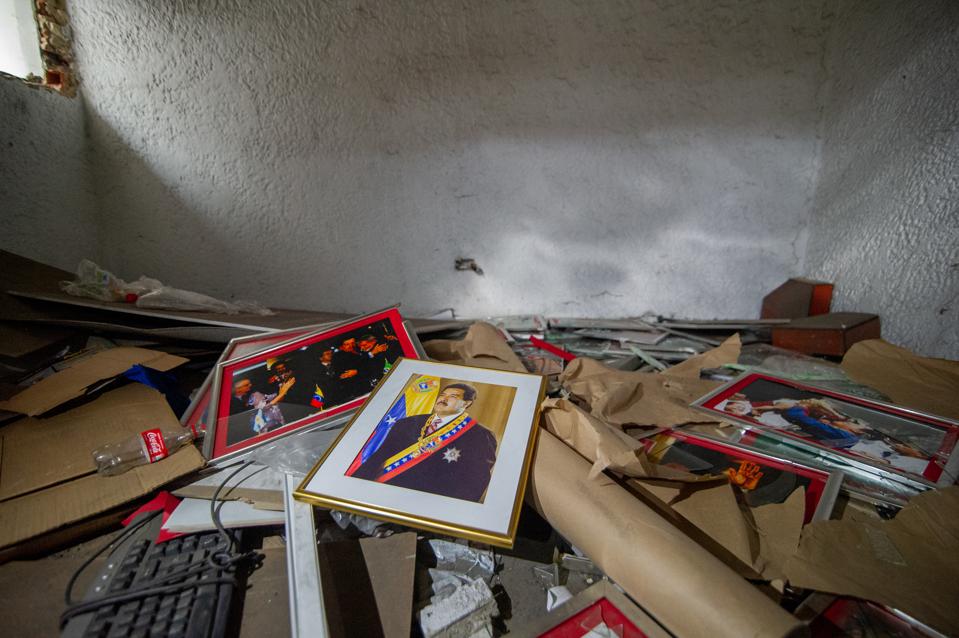Publisher’s Note: Bernadette Johnson from Enverus will be presenting at The Oil & Gas Conference this coming August 17-19, 2020. Register to attend.
The last oil rig has officially left the premises. In Venezuela, that is. There, Nabors said it had shut down its final active drilling rig as of Monday. As reported by Sergio Chapa at the Houston Chronicle, this action now brings the active rig count in that formerly prosperous socialist nation to zero. A complete flatline.

Source: Forbes
Think about that for a moment: Venezuela is home to larger oil reserves than any other nation on earth, including the United States, Saudi Arabia, Iran and Russia. Yet, because of the brutal nature and, frankly, stupidity of the Nicolas Maduro regime, not a single company is any longer willing to try to explore for that massive sunken treasure. Contrast that stark reality to Venezuela’s neighboring nations of Guyana and Suriname, democracies in which international companies like ExxonMobil XOM +0.9%, Hess, CNOOC, Apache Corp. APA +2.3% and Total continue to invest billions in new capital in highly-successful offshore oil exploration efforts.
The final Nabors rig had been operating in the prolific Petropiar Field at the behest of a joint venture between Chevron CVX +0.5% and PdVSA, the national Venezuelan oil company. But as the situation in Venezuela has spiraled into chaos over the past half-decade, the operations there had been plagued by delays, equipment theft and power failures.
Chevron’s decision to halt its drilling program came months after the Trump Administration had initiated a new round of harsher sanctions on the Venezuelan government. According to the Congressional Research Service, as a part of a comprehensive set of sanctions on the Maduro regime, the U.S. government has sanctioned:
- PdVSA, the Venezuelan national oil company;
- 144 Venezuelan or Venezuela-connected individuals;
- The Maduro government and its central bank;
- Two subsidiaries of the Russian government-controlled Rosneft Oil Company for facilitating exports of Venezuelan crude; and
- Four other shipping companies for transporting Venezuelan oil.
The Trump Administration has also revoked the visas of hundreds of Venezuelans and their familiies. Despite those and other sanctions, the U.S. had issued licenses that allowed Chevron, Nabors, Schlumberger SLB +1.2%, Halliburton HAL +1.3% and Baker Hughes BHI +2.7% to continue doing business in the country.
The breakdown of Venezuelan society at the hands of the Maduro regime has cost Chevron dearly: The company reported an operating loss of $8.3 billion for the second quarter, $2.6 billion of which was due to a forced write-down of the value of its Venezuelan reserves.
Bernadette Johnson, Vice President of Strategic Analytics at Enverus, said in an email that the exit by Chevron and Nabors was not unexpected: “Venezuelan production for June was reported at 300 MBbl/d by the IEA. This is decline from May 2020 and a continuation of the downward spiral the market has observed since 2012 when the country was producing 2.6 MMbbl/d (mid-year data point) and before the economic collapse and general upheaval in the country. The loss of the last remaining rig as a result of concerns that the Venezuelan government could seize it is an unfortunate but not unexpected development.”
At its peak in 1998, Venezuela produced almost 3.5 million barrels of oil per day. Perhaps coincidentally, that was the year that Hugo Chavez, Maduro’s socialist predecessor in office, was first elected. As Johnson notes, the country’s production had collapsed to just more than 300,000 bopd in June. The foothold gained by China in the country in recent years could now become the only factor that might prevent production levels from eventually flat-lining entirely.
The absolute disintegration of the country’s once-booming oil and gas industry is just one of many elements in the story of Venezuela’s sad collapse under Chavez and Maduro. But it’s a big one, since the collapse of the country’s oil and gas wealth is directly tied to the collapse of its entire economy. I would flippantly say that someone should turn out the lights as the last oil rig leaves the once-wealthy nation, but sadly for the people of Venezuela, that has already happened across vast swaths of their land.

